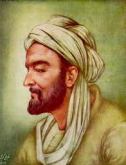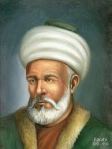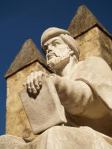A. DESCRIPTION OF UNIVERSITY Muhammadiyah Malang
University of Muhammadiyah Malang (UMM), is one of Muhammadiyah charitable efforts in the field of higher education. Founded in 1964, the motto became The Real University with mempadukan scientific tradition and Islamic values, as the main pillar is reflected in the intensity of education, teaching, research and community service unrelenting. Development of the University of Muhammadiyah Malang (UMM) future should at least pay attention consistently to 3 (three) things: First, the presence of University of Muhammadiyah Malang can not be separated from Persyarikatan organization Muhammadiyah, because basically UMM is a tool in the propaganda struggle Muhammadiyah “enjoining nahi munkar “where the field of education as a medium. Therefore, all activities and movements UMM development should be pursued always with the vision and mission of Muhammadiyah Persyarikatan. Second, the University of Muhammadiyah Malang is that higher education has the responsibility and consequences for producing graduates both D-III, S1 and S2 are enabled, master of science in accordance with the well field based on the demands and expectations of the curriculum standards as a service user’s public higher education graduates. Third, on the basis of the above two things, the development of the University of Muhammadiyah Malang has to do with patterns Persyarikatan terintesi between demands and the demands of higher education and the community. Kerterpaduan is necessary to realize the mandate Persyarikatan as the implementation of its commitment to national values and the Indonesiaan.
VISION: Making the top universities in the berkeunggulan higher education science and technology, culture and morality, bersendikan the scientific tradition and Islamic values.
University of Muhammadiyah Malang (UMM), is one of Muhammadiyah charitable efforts in the field of higher education. Founded in 1964, the motto became The Real University with mempadukan scientific tradition and Islamic values, as the main pillar is reflected in the intensity of education, teaching, research and community service unrelenting. Development of the University of Muhammadiyah Malang (UMM) future should at least pay attention consistently to 3 (three) things: First, the presence of University of Muhammadiyah Malang can not be separated from Persyarikatan organization Muhammadiyah, because basically UMM is a tool in the propaganda struggle Muhammadiyah “enjoining nahi munkar “where the field of education as a medium. Therefore, all activities and movements UMM development should be pursued always with the vision and mission of Muhammadiyah Persyarikatan. Second, the University of Muhammadiyah Malang is that higher education has the responsibility and consequences for producing graduates both D-III, S1 and S2 are enabled, master of science in accordance with the well field based on the demands and expectations of the curriculum standards as a service user’s public higher education graduates. Third, on the basis of the above two things, the development of the University of Muhammadiyah Malang has to do with patterns Persyarikatan terintesi between demands and the demands of higher education and the community. Kerterpaduan is necessary to realize the mandate Persyarikatan as the implementation of its commitment to national values and the Indonesiaan.
VISION: Making the top universities in the berkeunggulan higher education science and technology, culture and morality, bersendikan the scientific tradition and Islamic values.
MISSION: 1. Quality education
2. Conducting research and community service to promote general equality.
3. Organizing the management of the institution with the mandate and professional.
4. Organizing academic coaching in Islamic life so as to beruswah hasanah (being a good role model).
5. Organizing collaboration with others for mutual benefit.
OBJECTIVES: 1. Produce graduates who are faithful, devoted, mastering science and technology, professional, creative, innovative, responsible, and independent towards the realization of the main
2. a. Increasing research activity as a foundation for education and develop science and technology.
b. Produce, practice, develop, and disseminate science and technology in a regional, national and international.
3. Brought management premeditated, organized, productive, effective, efficient and reliable to ensure the sustainability of the university.
4. Achieve academic community that can be a role model and community life.
5. Cooperation with other parties in regional, national and international levels to the development of education and research.
GOAL ACHIEVEMENT STRATEGY
Core business UMM higher education is a service industry, therefore improving the quality of teaching and learning, research and community service must continue to be done in order to improve the quality of graduates. To achieve these objectives the strategy are as follows:
1. Conduct a self-evaluation
Self-evaluation is an important part of the process of developing a course on an ongoing basis. Therefore, to conduct a self-evaluation, it is necessary to data collection as complete as possible and then do the analysis and interpretation of the data. The data collected then to do analyst diguanakan SWOT (SWOT Analysis).
To perform a self-evaluation, some of the components that need to be evaluated, among others;
a. Environmental setting, which includes the relevant external conditions, such as the labor market, the development of industrialization, economic growth and technological development trends, including demand / labor demand with an undergraduate qualification.
b. The quality of graduates produced, which includes the waiting time to get the job first, GPA and received the first salary,
c. Teaching and learning, student characteristics, and organizational management, academic staff, physical facilities, laboratories, libraries, curriculum and finance.
The evaluation is done by relying on the services provided by the University of Muhammadiyah Malang and oriented to the satisfaction of all customers (customer), the customer either primary, secondary and tertiary.
2. Improving the quality of teaching and learning process through:
a. Consistently to continually improve the quality of lecturers:
Encourage teachers to pursue further studies, so in 2008 all teachers are qualified S2 minimum.
Project a qualified lecturer S3 (doctorate).
Projecting faculty with academic rank prediction in 2010 is expected of each study program has produced at least 1 (one) great teacher.
University seeks funding agencies (sponsors) to provide scholarships for faculty who will pursue further studies.
b. To improve faculty teaching skills through:
Search, find and adopt new teaching methods to be applied in the teaching-learning process.
Optimize the function and role of the Academic Quality Control Board (BKMA) to support the improvement of teaching skills for lecturers.
Develop a mentoring system for junior lecturers who have not experienced by senior lecturers.
c. Improving the quality of graduates through:
Improve the quality standards of incoming freshmen (raw input) and the recruitment of faculty and staff (instrumental input) promotion and coaching for the following question.
Completion of the teaching-learning process into a system that is efficient, effective, and by directing students and faculty to make the most of a variety of learning resources available.
Improving academic assessment system for students.
Improved manufacturing of the final system, especially for students whose academic ability is below average.
d. Optimizing the roles and functions of the Academic Quality Control Board (BKMA) to audit the implementation of teaching and learning, research and writing of scientific work done by the lecturers.
f. Optimizing the use of digital library and information technology installations available for teaching and learning activities (PBM).
2. Conducting research and community service to promote general equality.
3. Organizing the management of the institution with the mandate and professional.
4. Organizing academic coaching in Islamic life so as to beruswah hasanah (being a good role model).
5. Organizing collaboration with others for mutual benefit.
OBJECTIVES: 1. Produce graduates who are faithful, devoted, mastering science and technology, professional, creative, innovative, responsible, and independent towards the realization of the main
2. a. Increasing research activity as a foundation for education and develop science and technology.
b. Produce, practice, develop, and disseminate science and technology in a regional, national and international.
3. Brought management premeditated, organized, productive, effective, efficient and reliable to ensure the sustainability of the university.
4. Achieve academic community that can be a role model and community life.
5. Cooperation with other parties in regional, national and international levels to the development of education and research.
GOAL ACHIEVEMENT STRATEGY
Core business UMM higher education is a service industry, therefore improving the quality of teaching and learning, research and community service must continue to be done in order to improve the quality of graduates. To achieve these objectives the strategy are as follows:
1. Conduct a self-evaluation
Self-evaluation is an important part of the process of developing a course on an ongoing basis. Therefore, to conduct a self-evaluation, it is necessary to data collection as complete as possible and then do the analysis and interpretation of the data. The data collected then to do analyst diguanakan SWOT (SWOT Analysis).
To perform a self-evaluation, some of the components that need to be evaluated, among others;
a. Environmental setting, which includes the relevant external conditions, such as the labor market, the development of industrialization, economic growth and technological development trends, including demand / labor demand with an undergraduate qualification.
b. The quality of graduates produced, which includes the waiting time to get the job first, GPA and received the first salary,
c. Teaching and learning, student characteristics, and organizational management, academic staff, physical facilities, laboratories, libraries, curriculum and finance.
The evaluation is done by relying on the services provided by the University of Muhammadiyah Malang and oriented to the satisfaction of all customers (customer), the customer either primary, secondary and tertiary.
2. Improving the quality of teaching and learning process through:
a. Consistently to continually improve the quality of lecturers:
Encourage teachers to pursue further studies, so in 2008 all teachers are qualified S2 minimum.
Project a qualified lecturer S3 (doctorate).
Projecting faculty with academic rank prediction in 2010 is expected of each study program has produced at least 1 (one) great teacher.
University seeks funding agencies (sponsors) to provide scholarships for faculty who will pursue further studies.
b. To improve faculty teaching skills through:
Search, find and adopt new teaching methods to be applied in the teaching-learning process.
Optimize the function and role of the Academic Quality Control Board (BKMA) to support the improvement of teaching skills for lecturers.
Develop a mentoring system for junior lecturers who have not experienced by senior lecturers.
c. Improving the quality of graduates through:
Improve the quality standards of incoming freshmen (raw input) and the recruitment of faculty and staff (instrumental input) promotion and coaching for the following question.
Completion of the teaching-learning process into a system that is efficient, effective, and by directing students and faculty to make the most of a variety of learning resources available.
Improving academic assessment system for students.
Improved manufacturing of the final system, especially for students whose academic ability is below average.
d. Optimizing the roles and functions of the Academic Quality Control Board (BKMA) to audit the implementation of teaching and learning, research and writing of scientific work done by the lecturers.
f. Optimizing the use of digital library and information technology installations available for teaching and learning activities (PBM).
B. ACHIEVEMENTS IN THE TRI DHARMA COLLEGE
Referring to the Tri Dharma University in the era of high competition (hyper-competitive), the University of Muhammadiyah Malang as an institution of higher education has been able to develop a research-based academic atmosphere and Community Service. Some of the activities of Tri Dharma University in each course that has been successfully implemented by the University of Muhammadiyah Malang is as follows:
Table 1: Condition Studies Program at the University of Muhammadiyah Malang
Referring to the Tri Dharma University in the era of high competition (hyper-competitive), the University of Muhammadiyah Malang as an institution of higher education has been able to develop a research-based academic atmosphere and Community Service. Some of the activities of Tri Dharma University in each course that has been successfully implemented by the University of Muhammadiyah Malang is as follows:
Table 1: Condition Studies Program at the University of Muhammadiyah Malang
Program Description
1 ahwal Syakhsyiyah
2 Pend.Agama Islam
3 Master of Religion
4 Electrical Engineering
5 Mechanical Engineering
6 Industrial Engineering
7 Civil Engineering
8 D-3 Electro
9 Technical Information
Permission (647/D/T/2005)
10 Tech. Agricultural
11 Socio-Economic
12 Agronomy
13 Master of Agribusiness
Permission (012/D/T/2004)
14 Forest Cultivation
15 Tech Ind. Livestock
16 Livestock Production
17 Aquaculture
18 Pend Mathematics
19 Pend Biology
20 Pend. Civic Legal
21 Pend. Language and Literature
22 Pend. English
23 Masters Pend Policy.
Permission (1110/D/T/2004)
24 Sciences Eko. & Study of Mental Dev
25 Management
26 Accounting
27 D-3 Keu. & Banking
28 Master of Management
29 Government Science
30 Sociology
31 Science Communication
32 Social Welfare
33 International Relations
Permission (647/D/T/2005)
34 Psychology
35 Legal Studies
36 Master of Law
Permission (1339/D/T/2004
37 D-Nursing
38 Nursing (S1)
Permission (33681/D/T/2006
39 Medical Education
Permission (142/DIKTI/Kep/2001
40 Pharmacy
Permission (1964/D/T/2006)
2 Pend.Agama Islam
3 Master of Religion
4 Electrical Engineering
5 Mechanical Engineering
6 Industrial Engineering
7 Civil Engineering
8 D-3 Electro
9 Technical Information
Permission (647/D/T/2005)
10 Tech. Agricultural
11 Socio-Economic
12 Agronomy
13 Master of Agribusiness
Permission (012/D/T/2004)
14 Forest Cultivation
15 Tech Ind. Livestock
16 Livestock Production
17 Aquaculture
18 Pend Mathematics
19 Pend Biology
20 Pend. Civic Legal
21 Pend. Language and Literature
22 Pend. English
23 Masters Pend Policy.
Permission (1110/D/T/2004)
24 Sciences Eko. & Study of Mental Dev
25 Management
26 Accounting
27 D-3 Keu. & Banking
28 Master of Management
29 Government Science
30 Sociology
31 Science Communication
32 Social Welfare
33 International Relations
Permission (647/D/T/2005)
34 Psychology
35 Legal Studies
36 Master of Law
Permission (1339/D/T/2004
37 D-Nursing
38 Nursing (S1)
Permission (33681/D/T/2006
39 Medical Education
Permission (142/DIKTI/Kep/2001
40 Pharmacy
Permission (1964/D/T/2006)
source: http://rokib37.wordpress.com/2012/09/21/universitas-muhammadiyah-malang/


